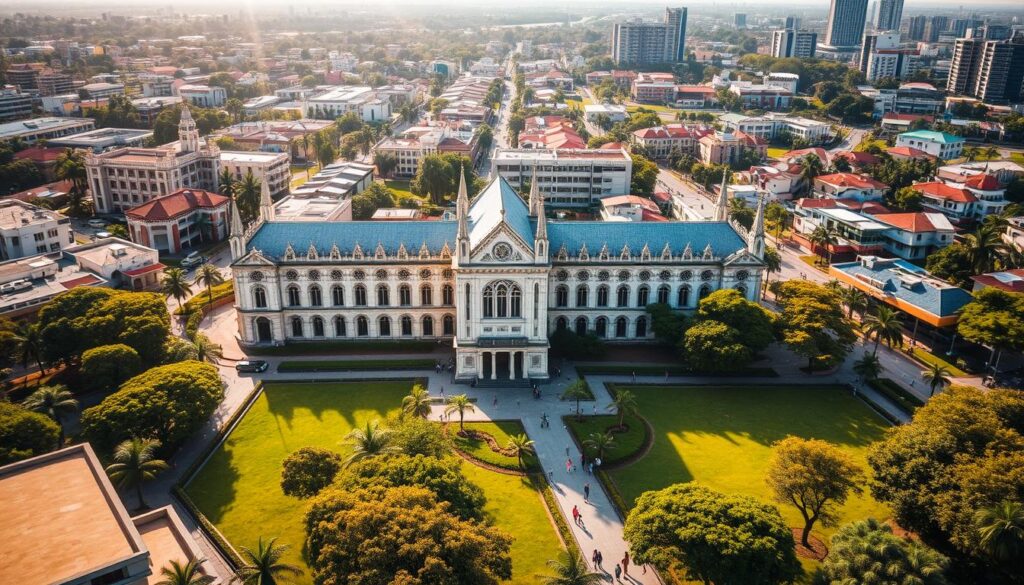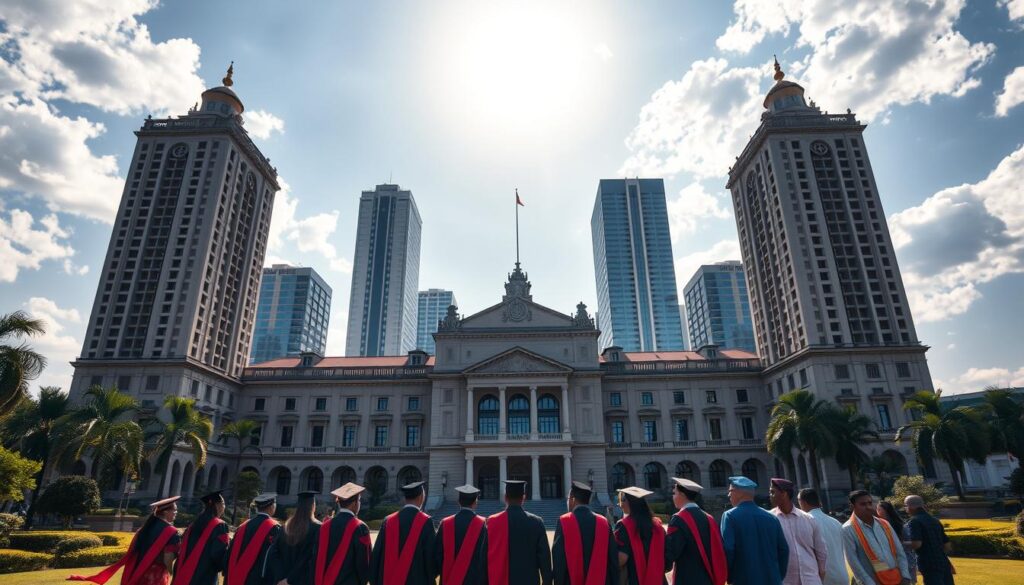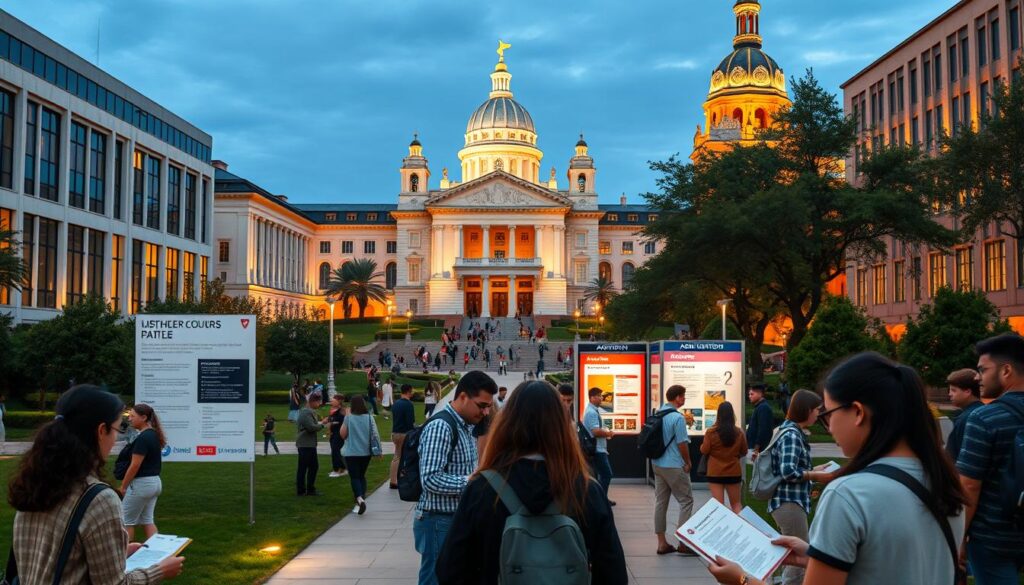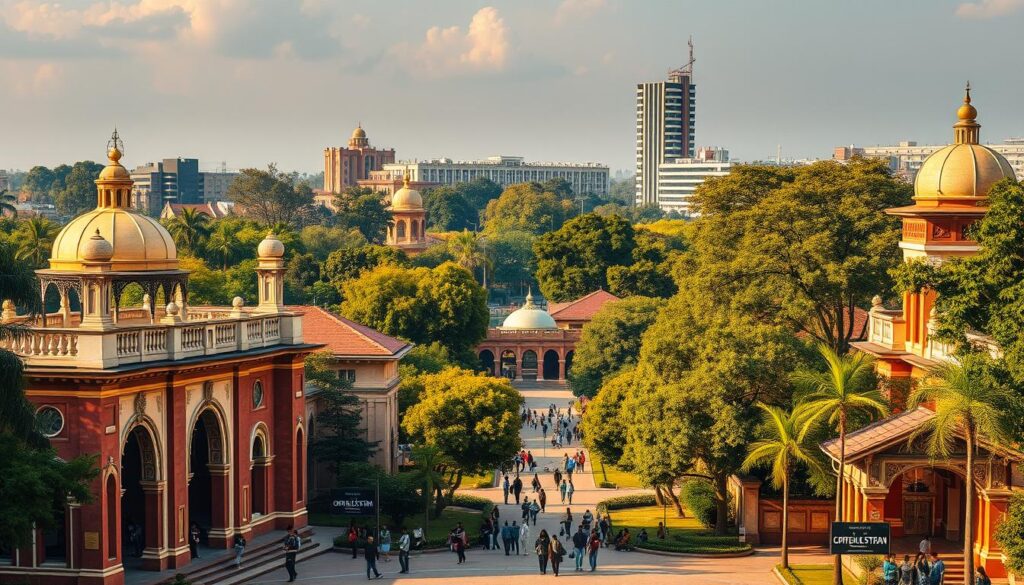Founded in 1857, this historic institution stands as one of the country’s oldest and most respected centers of learning. With over 167 years of academic excellence, it has shaped countless professionals and scholars.
Recently awarded NAAC A++ accreditation, the institution maintains high standards in education and research. Its six campuses support a vast network of affiliated colleges, offering diverse programs for students.
Over 86 postgraduate courses and more than 1,100 research submissions in 2023 highlight its commitment to innovation. Notable alumni, including Nobel Laureate C.V. Raman, reflect its global impact.
With a thriving community of scholars, it continues to be a cornerstone of higher education. Its legacy blends tradition with modern advancements, making it a preferred choice for aspiring minds.
The Legacy of Madras University: A Historical Overview
With roots tracing back to the British colonial era, this esteemed institution began its journey in 1857. Signed under the East India Company’s charter, it was modeled after the University of London, blending Western and Indian educational frameworks.
Establishment in 1857 Under British Rule
The 1839 petition by Sir Edward Elliot paved the way for its creation. By 1857, it became one of the oldest centers of higher learning in Asia. Its early curriculum focused on humanities, sciences, and law, training civil servants for the colonial administration.
Evolution Into a Premier Indian University
Post-independence, it expanded its role, mentoring newer universities in India like Kerala and Mysore. Today, it oversees a network of affiliated colleges, maintaining its reputation for rigorous academics. Over 84,500 graduates have passed through its halls since inception.
Notable Alumni and Global Contributions
Its faculty and alumni include luminaries like President Radhakrishnan and Indra Nooyi, former CEO of PepsiCo. The 2023 gender ratio (42:58 male-to-female) and 12% international students reflect its inclusive ethos. This legacy continues to inspire global academic excellence.
Academic Excellence at Madras University

Academic rigor meets innovation in its extensive courses. With 18 schools and 6,997 online journals, students access world-class resources. Over 1,404 postgraduate scholars completed degrees on time in 2023, reflecting its structured learning environment.
Undergraduate and Graduate Programs
Popular full-time programs include MBA (55% cutoff) and M.Sc Biotechnology. The Executive MBA blends industry insights with leadership training. Each course aligns with global standards, ensuring employability.
Research Opportunities and Ph.D. Offerings
The Ph.D. program spans 3 years with ₹1.5 lakh annual lab budgets. In 2023, 50 scholars graduated, contributing to fields like renewable energy and AI. Campus drives placed 339 researchers in top firms.
Distance Education Through IDE
The Institute of Distance Education (IDE) offers 75+ programs, including BCA and Yoga diploma certificates. Flexible schedules allow professionals to study while working. IDE’s e-library hosts 333 e-books for remote learners.
Why Madras University Chennai India Stands Out

Renowned for its academic distinction, this institution sets benchmarks in higher education. Its blend of rigorous programs and cutting-edge research attracts students globally.
NAAC A++ Accreditation and UGC Recognition
With a NAAC A++ rating (3.32 CGPA) valid through 2024, it ranks among India’s top 1% of accredited universities. The UGC consistently recognizes its infrastructure and faculty excellence.
Global Rankings and Collaborations
In 2023, it secured a spot in the QS World Rankings and earned 5 QS Stars for employability. Partnerships with 11 foreign universities, including exchanges in AI and biotechnology, enhance its global rankings.
The Computer Science department boasts a 100% placement rate, with graduates joining firms like TCS and Infosys. Such achievements cement its status as a leader in education.
Campuses and Infrastructure

Spread across six specialized campuses, this institution offers state-of-the-art infrastructure for academic growth. From historic buildings to modern labs, each location caters to distinct fields of study.
Six Campuses and Their Specializations
The Chepauk campus focuses on humanities and social sciences, while Guindy excels in STEM programs. Taramani is a hub for biosciences, featuring advanced research labs.
Hostel fees average ₹62,400 annually, with off-campus living costs around ₹8,000/month. Each campus provides:
- Smart classrooms (186 total) with digital tools
- LEED-certified buildings powered by solar energy
- Recreation rooms and auditoriums for events
Libraries, Labs, and Green Initiatives
With 571,745 physical books and 6,997 online journals, the libraries support deep learning. The physics departments boast 10 labs, each accommodating 40 students.
Sustainability is a priority—121,413 sq ft of built space meets eco-friendly standards. The 126-acre main campus blends greenery with high-tech facilities, fostering innovation.
Courses Offered Across Disciplines

Diverse academic pathways cater to students’ evolving career goals. With 86 postgraduate programs and 32 international journal subscriptions, learners access cutting-edge knowledge in their chosen field.
Popular Undergraduate Degrees
Foundational programs blend theory with practical skills. Top choices include:
- B.A. Economics: Covers policy analysis and quantitative methods.
- B.Sc Computer Science: Focuses on AI basics and software development.
- B.Com: Integrates accounting with digital business trends.
Postgraduate Programs in Arts and Sciences
Post graduate courses combine research and specialization. Unique options stand out:
- M.A. Folklore Studies: Explores cultural heritage and oral traditions.
- M.Sc Epidemiology: Addresses global health challenges with data-driven approaches.
- Interdisciplinary M.Tech: Requires Geography or Statistics backgrounds for spatial analytics.
Diploma and Certificate Courses
Short-term programs enhance job-ready skills. Recent additions include:
- 6-month Data Analytics diploma certificate: Teaches Python and visualization tools.
- AI/ML Specializations (2023 launch): Covers neural networks and ethics.
Seven digital databases support self-paced learning for these certifications.
Admission Process and Eligibility

Navigating the admission process requires understanding key eligibility criteria and deadlines. The institution offers transparent guidelines for UG, PG, and international candidates, ensuring equal opportunities.
UG and PG Admission Criteria
Undergraduate programs require a minimum of 60% in 12th grade, while PG courses demand a relevant bachelor’s degree. The Executive MBA has a 55% cutoff, with relaxed thresholds for reserved categories.
SC/ST applicants enjoy fee waivers, and migration documents must be submitted within 30 days of enrollment. Merit-based selections dominate arts programs, whereas STEM fields prioritize entrance scores.
Entrance Exams and Merit-Based Selection
TANCET scores govern MBA/MCA admissions, with weightage given to interviews. For research programs, 70% of seats are allocated via entrance tests, and 30% by academic merit.
Required documents include:
- Community certificates for reservation benefits
- Mark sheets with self-attestation
- Passport-sized photographs
Application Steps for International Students
Global candidates follow a 5-step process:
- Submit academic transcripts (translated if necessary)
- Pay ₹2,000 via the online portal
- Upload a valid student visa
- Attend a virtual interview
- Receive admission confirmation within 15 days
In 2023, four international scholars joined across disciplines. Grievances are resolved within 15 working days via a dedicated helpline.
Affiliated Colleges and Their Reputation

With over 120 affiliated colleges, this network forms a powerhouse of academic excellence. These institutions blend heritage with modern pedagogy, offering students specialized programs and robust career support.
Top Colleges Under the Network
Five standouts lead in NIRF rankings and industry partnerships:
- Loyola College: 95% placement rate in 2023, with top recruiters like Deloitte.
- Presidency College: TCS-backed labs for AI and data science research.
- Stella Maris College: All-women STEM initiatives with 80% internship conversion.
Unique Offerings at Affiliated Institutions
Beyond academics, these schools foster innovation:
- Ethiraj College’s entrepreneurship incubator launched 12 startups in 2023.
- MCC’s 200-year-old botanical gardens serve as a living lab for ecology students.
Hostel facilities vary, from Loyola’s air-conditioned dorms to Stella Maris’s mentorship-driven residences. Each campus invests in faculty development, ensuring cutting-edge instruction.
Student Life and Campus Culture
Campus life thrives with a mix of academics, sports, and cultural events. Over 1,150 hostel residents enjoy a supportive community, with a balanced 42:58 gender ratio. From sunrise study sessions to late-night debates, every moment fuels growth.
Hostels, Sports, and Extracurriculars
Hostels offer more than beds—think 24/7 library access and a 5GB WiFi quota. Sports facilities include a cricket ground, basketball courts, and table tennis zones. The NSS program replaces NCC, organizing tree drives and blood camps.
An anti-ragging cell ensures safety, resolving complaints within 72 hours. Flexible study spaces and collaboration hubs cater to group projects. During 3-day placement seasons, recruiters scout talent at on-campus fairs.
Annual Festivals and Academic Events
The *Madras Youth Summit* draws 2,000+ participants for debates and startup pitches. Departments host hackathons, with winning teams earning incubation support. Faculty-judged research symposiums spotlight innovations in AI and renewable energy.
Cultural weeks celebrate diversity through dance, music, and art. Affiliated colleges join forces for inter-campus tournaments. Whether coding marathons or poetry slams, there’s always something to spark passion.
Scholarships and Financial Support
Financial support opens doors for countless students pursuing higher education. Over 15+ schemes, including Post-Matric and INSPIRE, ensure affordability for diverse learners. SC/ST candidates benefit from full fee waivers, while merit-based aid rewards academic excellence.
Government and Merit-Based Aid
The Post-Matric Scholarship covers tuition and hostel fees for marginalized groups. INSPIRE offers ₹80,000 annually to top science students. Alumni-sponsored initiatives, like the Women in STEM Fund, provide ₹50,000 grants annually.
COVID-19 relief included installment plans for fee payments. In 2023, 25 entrepreneurship grants helped launch student startups. The highest placement package reached ₹12 lakh, showcasing ROI for beneficiaries.
Fellowships for Research Scholars
Ph.D. candidates receive UGC-NET/JRF funding of ₹31,000/month for 5 years. The institution also partners with industries for sponsored research, offering lab budgets up to ₹1.5 lakh. In 2023, 271 PG scholars used these funds for advanced studies.
Key steps for application include submitting income certificates and academic transcripts. Deadlines align with the academic calendar, ensuring timely disbursals. A dedicated portal streamlines the process for transparency.
Placements and Career Opportunities
Graduates step into thriving careers with strong industry connections. In 2023, 34 top firms participated in campus drives, offering roles across management, tech, and research. The average package reached ₹4 lakh, with commerce graduates securing the highest at ₹12 lakh.
Top Recruiters and Salary Benchmarks
Deloitte, Accenture, and Wipro lead annual recruiters, hiring 60% of MBA graduates. STEM field placements average ₹5.2 lakh, while humanities see 78% internship-to-job conversions. Overseas roles in UAE and Singapore grew by 15% last year.
Entrepreneurship and Academic Advancement
The incubation center fostered 11 student startups, including AI-driven healthcare apps. Over 50 PG scholars pursued a degree in Ph.D. programs, supported by industry collaborations. Alumni networks actively mentor aspiring founders and researchers.
Research and Innovation at Madras University
Cutting-edge research defines this institution’s global academic footprint. With a ₹15M annual budget and 1,115 Shodhganga theses, it fosters breakthroughs across disciplines. Faculty-led projects span AI, renewable energy, and cultural preservation.
Key Research Centers and Publications
The Centre for Cryptocurrency Research explores blockchain applications for finance. Seven departments collaborate on biotechnology, filing 3 patents in 2023 for sustainable agriculture.
A standout initiative is the Tamil Digital Heritage project, digitizing ancient manuscripts. Partner institutions like the Ford Foundation fund CSR programs in rural education.
Incubation Labs and Startup Support
Eleven student startups launched in 2023, including AI-driven healthcare tools. Ph.D. candidates receive UGC-NET funding (₹31,000/month) for projects like clean energy grids.
Global ties include 7 research collaborations with universities in Germany and Japan. These efforts cement its role as a hub for scalable innovation.
Future Goals and Expansion Plans
Looking ahead, ambitious strategies aim to redefine higher education through technology and sustainability. The institution is scaling interdisciplinary programs and digital infrastructure to meet global demands.
Interdisciplinary Programs and Digital Learning
A new AI Ethics department will launch in 2025, merging philosophy with tech studies. A ₹200M upgrade will modernize labs and virtual classrooms, supporting 40 planned online courses.
Key initiatives include:
- Maduravoyal Smart Campus: A hub for IoT and green tech research.
- Doubling international student intake with streamlined visa partnerships.
- *Digital learning* partnerships with MIT CSAIL for AI curriculum development.
Vision for 2030 and Beyond
By 2030, the goal is carbon neutrality through solar-powered campuses and electric shuttles. The faculty will expand by 20% to support emerging fields like quantum computing.
Collaborations with the Tamil Nadu government will introduce bike-sharing programs and zero-waste policies. These steps ensure the institution remains a leader in future-focused education.
Madras University: Shaping the Future of Indian Education
As one of India’s oldest institutions, this university continues to lead with a legacy of excellence. Preparing for its 2027 bicentennial, it aims to blend tradition with modern innovation.
Aligned with UNESCO’s SDGs, the focus is on sustainability and inclusive growth. Plans include expanding online programs by 50% by 2026, making education accessible to remote learners.
With over 167 years of impact, it remains a cornerstone of research and learning. Aspiring students can explore 2025 admissions to join this dynamic academic community.
The future vision includes cutting-edge labs, global collaborations, and eco-friendly campuses. This institution isn’t just preserving history—it’s building tomorrow’s leaders.